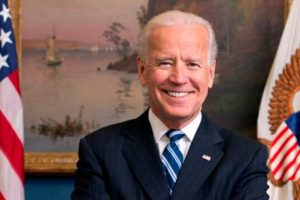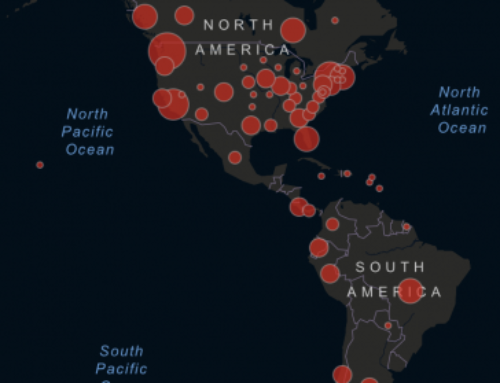The U.S Will Help But Latin America Must Commit to Itself First: Vice President Biden’s Remarks at the 20th Anniversary of CAF
By Pilar Frank O’Leary
 “I believe today we are at a dawning of a new era for the people of the [Americas]. It should no longer be fettered by history. We should not hesitate to work together, to dream big. Our relationships in the region are stronger than they have ever been. But this progress is still fragile… it requires a sustained commitment by all the parties, particularly the United States. We can’t wall ourselves off from problems that are not bound by borders — the threat of communicable diseases like Zika, drug trafficking, climate change. No wall can be built. None that can do that.”
“I believe today we are at a dawning of a new era for the people of the [Americas]. It should no longer be fettered by history. We should not hesitate to work together, to dream big. Our relationships in the region are stronger than they have ever been. But this progress is still fragile… it requires a sustained commitment by all the parties, particularly the United States. We can’t wall ourselves off from problems that are not bound by borders — the threat of communicable diseases like Zika, drug trafficking, climate change. No wall can be built. None that can do that.”
Last week, CAF celebrated its 20th anniversary at an annual conference organized in collaboration with the Inter-American Dialogue. CAF (otherwise known in Spanish by its full name, Corporación Andina de Fomento) has the mission of stimulating sustainable development and regional integration in Latin America by financing projects in the public and private sectors and providing technical cooperation and other specialized services. Founded in 1970 and currently with 18 member countries from Latin America, the Caribbean, and Europe along with 14 private banks, CAF is one of the main sources of multilateral financing for Latin America. CAF is still headquartered (amazingly) in Caracas, Venezuela and has representative Offices in Lima, Brasilia, Bogota, Buenos Aires, Quito, Panama, Montevideo and La Paz.
The CAF anniversary was significant not only as milestone but also because it marked the stepping down of the development bank’s long-standing president, Enrique Garcia who has served at the helm of the organization for over 25 years. It also came at a time when relations between the U.S. and Latin America are on the forefront of many people’s minds in this country and across the Americas in the context of the U.S. presidential election. (I was present at the conference with my father Richard H. Frank, CEO of Darby Private Equity, former interim President of the World Bank, CFO of the IFC and one of the early supporters of CAF.)
U.S. Vice President Joe Biden began his keynote address to a room packed with leading representatives from the private sector and policy makers from across the Americas. At the outset of his remarks, the Vice President stated that the time had come to ask not what “can the United States do for the region but what can the United States with the region”. This is a significant shift in tone from the normal U.S. stance towards Latin America which is often perceived as patronizing by many countries. Indeed, the Vice President acknowledged that,
“[T]here was a lot of history, a lot of baggage shaping our responsibilities and our relationships in the hemisphere. And it has to be based upon a respect that is across the board and sometimes has been lacking in the past 150 years.”
The visions, plans and attitudes reflected the Vice President laid in his speech out may very well be continued in an eventual Hillary Clinton presidency (though not likely in a Trump one). What was clear from almost every theme the Vice President touched on was that the U.S. is prepared to help Latin America so long as nations invest in democratic values, people and money first. It is only on this basis, the Vice President asserted, that the relationship can move forward into the next decade and beyond.
Biden talked about the significance of US Latin American relations, citing that nearly half of all U.S. exports – over $670 billion annually — go to countries in the hemisphere. For this reason, he said, the Obama administration has made it a priority to increase high-level economic cooperation and boost trading relationships throughout the region. As evidence of this, Biden cited U.S. sponsored programs to spur entrepreneurship, increased educational exchanges, a reform in immigration policy and a major shift in Cuba policy. The references to trade cooperation were particularly interesting especially given the looming ratification of the Trans-Pacific Partnership agreement (or TPP) which would significantly expand trade between the U.S. and other trading partners such as Mexico, Peru and Chile. The TPP is one of Obama’s pet projects—and one which has been heavily criticized by candidates in the current U.S. presidential election cycle, including Hillary Clinton. The Vice President made his Administration’s view clear that trade with Latin America is and always will be a priority and that agreements such as the TPP were incredibly important to that relationship.
Biden also made equally clear that while U.S. relationships with the private and public sectors in Latin America were improving, that challenges to human rights would not be tolerated. And he also said that complicated (read: “troubling”) political shifts in the region were taking place that needed to be handled with care—from Brazil, where President Dilma Roussef was recently impeached by the Brazilian congress to the violation of democratic principles in Venezuela, where hundreds of thousands of citizens have called for a presidential recall referendum and are condemning the unfair imprisonment and abuse of political prisoners.
On the flip side, Biden cited relatively bright spots in the region, such as the transformation of Colombia into a relatively stable nation after over five decades of war and the recent signing of a peace accord between the Colombian government and the rebel group, FARC. He acknowledged the agreement (which still needs to go to a general population referendum on October 2) does not mark the end, but rather the beginning of the next phase in Colombia’s difficult journey toward enduring peace. It is for this reason, he said, that the United States has pledged more than $390 million at the outset to support the implementation of the plan. Indeed, Colombia will need all the help it can get as it moves forward.
Biden also acknowledged the progress in Argentina is being made with newly elected President Macri who has paved a reform agenda in order for Argentina to return to the international financial community, improve security, increase trade and investment, strengthen the energy sector and boost cooperation between both the country and the U.S. Yet, Argentina too for all bullish plans will need steadfast U.S. support, patience and discipline, especially given current high inflation rates and unemployment.
Following this broad assessment of the Latin American region, the Vice President then turned what he deems as the 3 biggest challenges for Latin America and its relationship to the United States in the short to medium term: 1) corruption (or absence of the rule of law); 2) energy security; and 3) a lack of a cohesive policy towards Central America.
1. Corruption
The Vice President stipulated that continued economic growth in Latin America was impossible in the absence of the rule of law. He made it clear that his stance was not a “U.S. moral judgment” but that in his view, businesses (especially American businesses) do not invest in nations where the rules are not transparent, where the court system is unfair and where intellectual property is not protected. He went further, stating that behavior such as bribery and coercion diminishes the stability of societies and fuels organized crime and leads to human rights abuses. He called upon Latin American nations to take the necessary steps to arrest the cycle of corruption where it exists in their countries and cited his own administration’s efforts to combat corruption in the region. Some of these initiatives include working with the Inter-American Development Bank and other multi-lateral partners to improve the business environment (in areas such as transparency, streamlined customs procedures and improved tax collection) and the efforts of the U.S. Department of Justice to assist local officials in Latin America with investigations to fight organized crime. Biden also noted that the U.S. has sent security advisors to help train civilian police forces to respect human rights and aid prosecutors.
True to one of the prevailing themes of his speech, the Vice President said that while the U.S. would continue providing assistance in combatting corruption and crime, Latin American nations need to make a concrete commitment first to American democratic values before qualifying for help. As an example, Biden said that when the President of Guatemala asked for a military support plan similar to Plan Colombia, the then-Guatemalan president Alejandro Maldonado, did not want to adhere to international human rights norms and that the United States made it a condition for receiving the help.
Biden applauded the movements of civil citizens to combat corruption and prosecutors and those of judges taking a brave and risky stand to pursue crooked officials. Again turning to Guatemala as an example, Biden spoke about the former Guatemalan Attorney General who, working with the U.N. International Commission Against Impunity, has dismantled criminal networks, prosecuted military officials and even charged the former President and Vice President with corruption. He praised the new Guatemalan president, Jimmy Morales, a former comedian, on his public promise to fight corruption in his country. This is what the leaders of all Latin American nations have to do, he said.
2. Energy
The Vice President said that the second key ingredient for economic growth in Latin America was securing access to affordable and reliable energy sources. Today, over 34 million people in the region still lack access to electricity, making energy security in the region an immediate priority, especially before volatile oil prices inevitably rise again.
Biden said that the fact that North America has now an abundance of natural gas and clean and renewable energy resources is a net advantage for Latin America. Outside of Mexico being one of these sources, this didn’t make a whole lot of sense to me as being an advantage for the region. Yet Biden expounded, speaking in glowing terms about the inauguration of a new liquefied natural gas export terminal whose first shipment left Louisiana for Brazil in February and the opportunities afforded by the new Panama Canal expansion to supply the energy needs of Latin America.
The Vice President said that his administration has been equally investing in bolstering Latin American sources of energy. He said the Obama administration has been investing millions in development of the Central American power sector — including helping regional electricity suppliers develop clean energy plans and supporting efforts to maximize use of a regional transmission line which has tripled the volume of electricity traded across borders between countries like El Salvador, Honduras, and Costa Rica and reduced costs. In South America, the Vice President said the United States is working with partners “from Argentina to Chile to Colombia” to scale up renewable energy usage and to promote the safe and responsible development of unconventional oil and gas resources.
3. Central America
Finally, the Vice President had said that the time had come to focus on Central America, which for too long had been left out of the story of Latin America’s rise and is the hub uniting the Americas region: North and South. The region is tremendously challenging because of the concentration of many problems — energy insecurity, corruption, crushing poverty, endemic violence, poor education systems and transnational crime. The problems, unaddressed, have led to consequences in the United States such as the influx of thousands of unaccompanied minors from Central America.
Biden said the Obama administration has embraced a two-track approach on immigration — offering relief for Central American immigrants in immediate danger, while also instituting long-range efforts to address the drivers of migration. He talked about the Obama administration’s efforts to help with resettlement programs that permit citizens to remain in safer areas of the region, rather than immigrating under dangerous conditions to the United States. As an example of this, he cited U.S. support of the United Nations and Costa Rica in forging agreements to set up temporary shelters for refugees escaping violence. In my opinion, this is all well and good, but let’s face it: citizens leaving those Central American nations want to make it to the U.S. not resettle in the region and the fundamental problems existing in Central America will continue to draw people to the United States unless something fundamental changes in their societies.
Biden said the administration had also worked with countries to enhance their own border management, including at Mexico’s northern and southern border. He praised Mexico’s commitment and noted that in fact, migration from Mexico has diminished as the Mexican economy has strengthened. Mexico is indeed experiencing this dynamic but more innovative solutions need to be found for the rest of the region because of the economic and security conditions that exist in certain Central American nations which are not improving.
To that end, Biden some of the initiatives the Obama administration has instituted are already delivering benefits to the people of Central America. As an example, in Guatemala and Honduras, El Salvador, Biden said that the U.S. government is helping these countries in their vetting of police departments to eradicate corrupt officers– a practice that Biden said the U.S. helped Colombia implement. The U.S. is also supporting efforts in Central America to institute community policing programs in neighborhoods that previously never had a police force. Biden said the Obama administration was committed to helping eradicate transnational criminal networks that drive drug smuggling, human trafficking, and financial crime and has already established a significant program worth tens of millions of dollars called The Alliance for Prosperity to benefit Guatemala, Honduras, and El Salvador. This is all true and yet again, it is going to take a lot more bilateral commitment to make a dent in the current situation. Curiously, the Vice President didn’t address the progress that has been made by certain relatively stable Central American nations such as Costa Rica and Panama.
Biden stated that under the Obama Administration the United States will continue to support Central America in all the ways cited above (and others) so that countries can stabilize their societies and economies, making immigration to the U.S. is less attractive. But again, Biden urged that Central American nations must commit and adhere to their goals and invest themselves first in order to receive U.S. aid. He cited the cooperation and support given to Colombia under Plan Colombia as an example:
“Central American leaders have urged [our Administration] that they need a ‘Plan Colombia’ for the region. And our response [is]: understand for every dollar the United States put into Plan Colombia, Colombia put in $10. Colombia’s political leadership made some very dangerous and consequential decisions to make it work and we supported them. U.S. financial support [to Colombia] is predicated on negotiated agreement between the two countries to help eliminate corruption, provide transparency, reform their governments to grow the Colombian economy and enhance security under the equal application of the law. They are the criteria that need to exist before the enormous potential of [Central America] can be tapped.”
On the economic front too, the Vice President again said it was time for countries in Central America to invest in themselves both financially and socially before expecting support from the United States. He said,
“Businesses in those countries kept telling me what we have to do. And I said, where the hell are investing your money? You’re not paying any taxes? When X, Y, Z Corporation in Guatemala, Honduras, El Salvador invests in El Salvador, Guatemala, Honduras, instead of the United States or Europe, then you may be able to begin to change the environment where American companies who want to be engaged say, yes, it makes sense to invest here.”
The Vice President wrapped up his speech at CAF by saying that the Obama Administration would keep pushing on its agenda with Latin America with the region every day until the end. And then Biden couldn’t help but end his remarks with, “And God willing, we’ll be succeeded by a woman who shares our view.”
To me, the Vice President’s remarks were interesting in that they did in fact mirror statements that Hillary Clinton has made in the past about the region and most likely would reflect her policies towards Latin America going forward. The admonition that Latin America needs to commit to itself before expecting a handout from the U.S is well-taken at every turn. Yet, in some cases, this is easier said than done. There are some areas of Latin America where without U.S. strategic advice and financial resources from the outset, it will be incredibly difficult for any progress to be made.
It is in the utmost interest of the United States to ensure that Latin America is productive and stable for economic, political and social reasons. The attitude of always making Latin America a second priority in foreign policy realms has got to change, especially as the U.S. continues to reap rewards from favorable trade agreements and energy exports and, as investment by other economic competitors such as China, Korea and Europe continue to increase. Cooperation between the United States and the U.S. needs to be based on mutual respect and cultural understanding and not bravado and condescension. Organizations such as the Inter-American Dialogue, CAF and the IDB are helpful in this regard but they cannot do it alone. The U.S. needs to be a true collaborator—for its own good. Indeed, the time has come to do things “with” Latin America and not just “for”. Only then will the U.S. be able to reap the benefits of a true partnership in the Americas.
Pilar Frank O’Leary is Founder & President of PFO Advisory Group which provides government affairs and business development strategies for organizations working with Latin America and Spain. (Visit www.pfoadvisorygroup.com)




